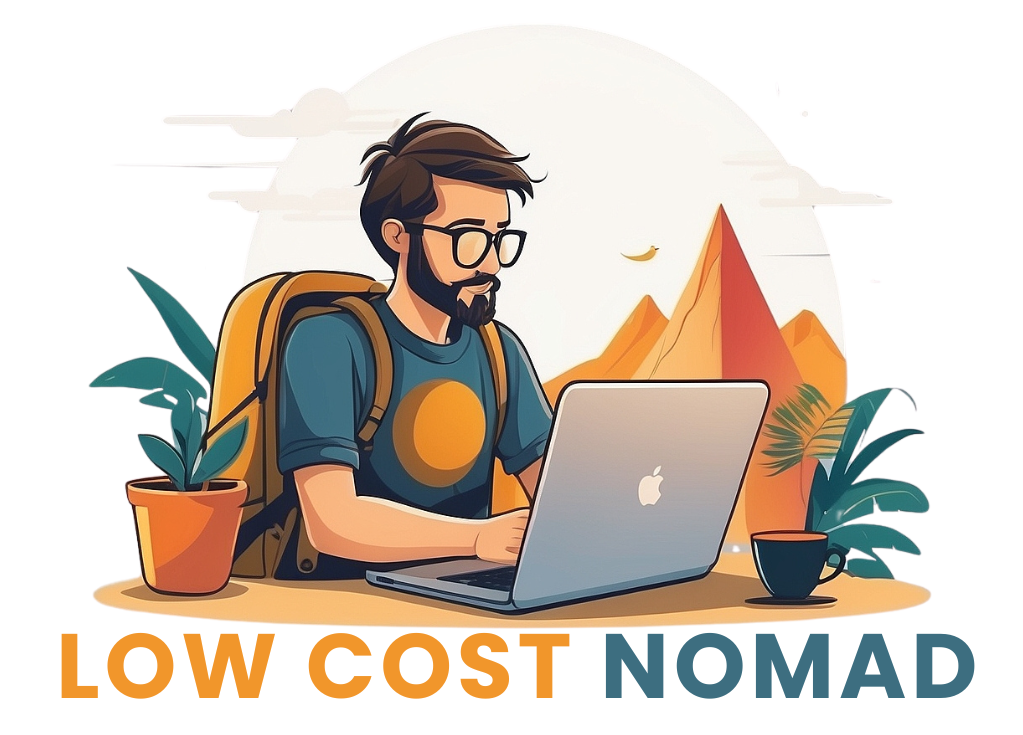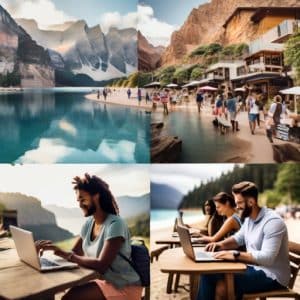The digital nomad lifestyle – the dream of working from anywhere, exploring new cultures, and living life on your own terms. It’s a powerful vision that attracts many. Images of laptops on beaches, workdays in bustling cafes, and weekends spent hiking mountains or exploring ancient ruins fill our screens. This freedom is incredibly appealing, offering a break from the traditional nine-to-five and the chance to see the world. However, like any lifestyle, the nomadic journey comes with its own unique set of challenges. Beneath the surface of adventure and freedom, there are significant hurdles, especially when it comes to navigating the complexities of mental health on the road. Staying grounded while constantly on the move is not always easy. This article explores the mental health landscape for nomads, highlighting common difficulties and providing practical strategies for maintaining well-being and finding stability no matter where you are in the world.
The Nomad Dream vs. The Reality Check
For many, becoming a digital nomad represents escaping stress – escaping commutes, office politics, and rigid routines. And in many ways, it delivers. The autonomy and flexibility can be huge boosts to happiness. But this freedom is a double-edged sword. Escaping one set of stressors often means encountering new ones. The very things that make the lifestyle exciting – constant change, new environments, meeting different people – can also be sources of anxiety, loneliness, and instability. The romantic idea of the nomad life sometimes overlooks the practical and emotional toll it can take. Understanding this reality is the first step in proactively managing your mental health while traveling and working remotely.
Common Mental Health Challenges Faced by Nomads
Living a life without a fixed address can bring about specific mental health challenges. While not every nomad experiences all of these, they are common themes that many have to navigate:
- Loneliness and Isolation: Moving frequently makes it hard to build deep, lasting connections. While you meet many people, friendships can be fleeting. This can lead to feelings of loneliness, even when surrounded by others, and a sense of not truly belonging anywhere.
- Lack of Routine and Structure: Traditional life often provides structure through work hours, social commitments, and home routines. Nomad life is often unstructured. While this offers flexibility, a complete lack of routine can make it hard to feel productive, stay motivated, or even regulate sleep patterns, negatively impacting mood and energy levels.
- Stress and Uncertainty: Constant planning for the next destination, dealing with visa issues, finding accommodation, managing finances across different currencies, and navigating unfamiliar cultures can be stressful. The inherent unpredictability of the lifestyle can cause chronic anxiety.
- Identity Issues: When your identity is partly tied to where you live and your social circles, constantly changing these elements can lead to questions about who you are and where you fit in. Feeling like you don’t have a stable “home” base can be unsettling for some.
- Homesickness: Missing family, old friends, familiar places, or even just the comfort of knowing where things are can weigh heavily. Homesickness isn’t just about missing people; it’s about missing a sense of belonging and familiarity.
- Burnout: The pressure to constantly work, travel, and experience everything can be exhausting. Unlike a traditional vacation, you’re often still working full-time while dealing with the logistics of travel. This can lead to mental and physical burnout.
- Difficulty Establishing Healthy Habits: Maintaining healthy eating habits, consistent exercise routines, and regular sleep schedules can be challenging when constantly changing time zones, trying new foods, and living in temporary accommodations.
Why Prioritizing Mental Health is Crucial for Nomads
Some might see mental health as secondary to the adventure, but it’s actually foundational to a successful and fulfilling nomad life. Neglecting your mental well-being can impact every aspect of your journey:
- Work Productivity: Anxiety, stress, or depression can make it incredibly hard to focus, meet deadlines, and perform your remote job effectively.
- Enjoyment of the Lifestyle: If you’re constantly stressed, lonely, or anxious, it’s difficult to truly appreciate the amazing places you visit and the experiences you have.
- Relationships: Mental health struggles can strain relationships with people back home and make it harder to form new connections on the road.
- Physical Health: Mental and physical health are deeply connected. Stress and poor mental health can manifest as physical problems, and neglecting self-care can worsen both.
- Decision Making: When you’re not in a good head space, you might make impulsive or poor decisions regarding travel, finances, or relationships.
In short, protecting your mental health as a nomad isn’t a luxury; it’s a necessity for sustainability and happiness on the road. It’s about creating a fulfilling lifestyle, not just collecting passport stamps.
Strategies for Staying Grounded: Protecting Your Mental Health on the Road
The good news is that there are many proactive steps nomads can take to protect their mental well-being and cultivate a sense of groundedness amidst the constant movement. Staying grounded means finding stability and peace within yourself, regardless of your external circumstances.
Establish a Flexible Routine
While the nomad life is about escaping rigid routines, having some structure is vital for mental stability. A completely unpredictable day can feel chaotic. Find a routine that works for you, but allow for flexibility.
- Wake-Up and Sleep Times: Try to maintain consistent sleep hours as much as possible, even when changing time zones. Good sleep is fundamental to good mental health.
- Work Hours: Set dedicated work times. This creates boundaries between work and leisure and helps you stay productive without feeling like you’re always “on.”
- Daily Rituals: Incorporate small, consistent rituals into your day, no matter where you are. This could be a morning coffee routine, a 15-minute walk, meditation, or journaling. These small anchors provide a sense of normalcy.
- Exercise: Schedule time for physical activity. This could be going to a local gym, finding a park for a run, doing bodyweight exercises in your accommodation, or trying a local yoga class. Exercise is a powerful stress reliever.
Nurture Social Connections
Combating loneliness requires conscious effort. Building and maintaining relationships is key.
- Connect with People Back Home: Schedule regular video calls with family and friends. Share your experiences and listen to theirs. This helps you feel connected to your roots.
- Seek Out Other Nomads: Use online communities (like Nomad List, Facebook groups, Meetup) to find other digital nomads in your current location. Meetups, co-working spaces, and social events can be great places to form new friendships with people who understand your lifestyle.
- Connect with Locals: Make an effort to interact with people in the places you visit. Learn a few phrases of the local language, join local clubs or classes (cooking, dancing, sports), or volunteer. This provides cultural immersion and a sense of community beyond just other travelers.
- Co-Working Spaces: These offer not just a place to work, but also opportunities to meet like-minded individuals and participate in social events.
Prioritize Self-Care
Self-care isn’t selfish; it’s essential for maintaining your energy and resilience.
- Listen to Your Body: Pay attention to signs of fatigue, stress, or feeling overwhelmed. Don’t push yourself constantly.
- Healthy Eating: While trying local foods is fun, make an effort to find healthy options and cook for yourself when possible. Eating well fuels your mind and body.
- Mindfulness and Relaxation: Practice meditation, deep breathing exercises, or spend time in nature. These help calm your mind and reduce anxiety. Even a few minutes a day can make a difference.
- Hobbies: Continue practicing hobbies you enjoy, or pick up new ones. Reading, playing music, drawing, writing, or photography can be grounding activities.
- Rest and Downtime: It’s okay to have days where you don’t explore. Sometimes, a lazy day reading or watching movies in your accommodation is exactly what you need to recharge.
Manage Stress and Uncertainty
Uncertainty is part of the deal, but you can develop coping strategies.
- Accept What You Can’t Control: Some things will go wrong – flights will be delayed, accommodation might not be perfect, plans will change. Learn to accept this and focus on finding solutions rather than dwelling on the problems.
- Develop Problem-Solving Skills: See challenges as puzzles to solve rather than disasters. Break down problems into smaller, manageable steps.
- Have a Buffer Fund: Financial worries are a major stressor. Having emergency savings for unexpected costs (medical, travel changes) can provide significant peace of mind.
- Plan Ahead (Flexibly): Do enough research to feel prepared, but don’t over-plan to the point where you can’t adapt. Have a general idea of your next steps, but be open to changing them.
Find Stability in Change
Instead of fighting the constant change, try to find stability within it.
- Identify Your “Anchors”: What gives you a sense of stability regardless of location? This could be your work, a specific hobby, a portable collection of books, regular calls with certain people, or a personal philosophy. Focus on these constants.
- Create a Sense of “Home,” Wherever You Are: Personalize your temporary living spaces, even slightly. Unpack your bags, put away clothes, buy a plant, or display a few personal items. Make it feel like *your* space for the time you’re there.
- Maintain a Digital “Home”: Your online world can also provide stability. Consistent online routines, participation in online communities, or maintaining a blog or journal can give you a sense of continuity.
Maintain a Sense of Purpose
Beyond just traveling, having a purpose can give your life meaning and direction.
- Meaningful Work: Try to find work that you find engaging and fulfilling. If your current remote job isn’t, consider how you could shift towards work that aligns with your values.
- Personal Goals: Set goals beyond just travel destinations. This could be learning a new skill (a language, coding, photography), working on a creative project, or pursuing a personal challenge.
- Connecting with Local Causes: Can you volunteer or contribute to a local community or environmental project in the places you visit? This can provide a strong sense of purpose and connection.
Handling Loneliness and Isolation
This challenge is significant enough to warrant its own focus within strategies.
- Understand It’s Normal: Acknowledge that feeling lonely is a common experience for nomads. You are not alone in feeling alone sometimes.
- Proactive Engagement: Don’t wait for connections to happen; actively seek them out. Join groups, attend events, initiate conversations at co-working spaces or cafes.
- Quality over Quantity: Focus on building a few deeper connections rather than countless superficial ones. Share openly and listen actively when you connect with others.
- Utilize Technology Mindfully: Social media can sometimes exacerbate loneliness if you’re only seeing highlight reels. Use technology for genuine connection (video calls, messages with substance) rather than passive scrolling.
Financial Stress Management
Money worries can seriously impact mental health.
- Create a Budget: Know how much money you have, how much you spend, and how long it will last. This reduces uncertainty.
- Diversify Income (If Possible): Relying on a single client or income stream can be stressful. Explore ways to have multiple sources of income if your situation allows.
- Plan for Downturns: Have a plan for what you’ll do if your income decreases or stops unexpectedly.
- Avoid Impulse Spending: Be mindful of your spending, especially when traveling, as it can add up quickly.
Seeking Support
Sometimes, self-help strategies aren’t enough, and that’s perfectly okay. Seeking professional help is a sign of strength.
- Online Therapy: Many therapists offer sessions online, making it accessible no matter where you are in the world. This is a valuable resource for processing challenges, learning coping mechanisms, or dealing with underlying issues.
- Support Groups: Look for online or in-person support groups specifically for nomads or people dealing with similar challenges (anxiety, depression, etc.).
- Talk to Trusted People: Share your feelings with understanding friends or family members. Sometimes, just talking about what you’re going through can make a difference.
- Know the Warning Signs: Be aware of signs that your mental health might be significantly struggling – prolonged sadness, loss of interest in activities you once enjoyed, changes in sleep or appetite, difficulty functioning. Don’t hesitate to seek help if you notice these.
The Importance of Self-Awareness
All these strategies rely on a foundation of self-awareness. Pay attention to how you’re feeling, what triggers stress or loneliness for you, and what activities genuinely make you feel better. Regularly check in with yourself emotionally and mentally. Journaling, meditation, or simply taking quiet time for reflection can help you build this awareness.
Balancing Freedom and Responsibility
The nomad life offers incredible freedom, but with that comes the responsibility for your own well-being. There’s no safety net of a stable community or workplace looking out for you in the same way. You are responsible for creating the stability you need. Embracing this responsibility empowers you to make conscious choices that support your mental health journey.
Creating a life you don’t need a vacation from is the goal, but even in paradise, internal challenges can arise. The key is to be prepared, proactive, and compassionate with yourself.
Summary: Building a Sustainable Nomad Life
The digital nomad lifestyle is full of incredible opportunities for growth, adventure, and personal freedom. However, it also presents unique challenges to mental health on the road. Loneliness, uncertainty, lack of routine, and managing stress are real issues that many nomads face. Staying grounded isn’t about stopping your travels; it’s about building internal stability and implementing strategies that support your well-being no matter your location.
Prioritizing your mental health is not a barrier to experiencing the world; it is the foundation that makes sustainable, fulfilling travel possible. By establishing flexible routines, actively nurturing social connections, prioritizing self-care, developing stress management skills, finding anchors in change, maintaining purpose, managing finances wisely, and being open to seeking support when needed, nomads can build resilience and thrive.
The journey of a digital nomad is personal and constantly evolving. Be patient with yourself, celebrate your successes, learn from challenges, and remember that taking care of your mind is just as important as planning your next destination. Embrace the adventure, but always make your mental health as a nomad a top priority. This will help you truly enjoy the freedom and richness of life on the road.




